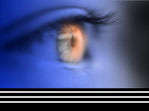|
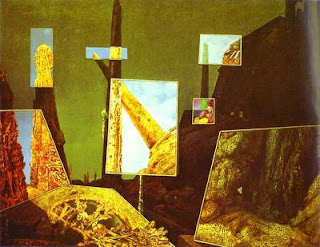
DAY AND NIGHT BY MAX ERNST
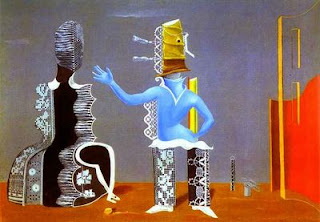
THE COUPLE IN LACE BY MAX ERNST
Carl Jung & the collective Unconscious from the Skeptics Dictionary:
The collective unconscious is a part of the unconscious mind common to all humans. According to Carl Jung, the
collective unconscious contains archetypes, universal mental predispositions not grounded in experience. Like Plato's Forms
(eidos), the archetypes do not originate in the world of the
senses, but exist independently of that world and are known directly by the mind. Unlike Plato, however, Jung believed that
the archetypes arise spontaneously in the mind, especially in times of crisis. Just as there are meaningful coincidences,
such as the beetle and the scarab dream described in the entry on synchronicity, which open the door to transcendent truths,
so too a crisis opens the door of the collective unconscious and lets out an archetype to reveal some deep truth hidden from
ordinary consciousness.
---

PAINTING OF SURREALISTS REUNION 1922 BY MAX ERNST.

"AGE OF ENLIGHTENMENT"
BY RENE MAGRITTE

" SKULL WITH CIGARETTE "
BY VINCENT VAN GOGH.
( IMAGES PROVIDED BY PICASA )
A Surrealist Manifesto:
The
Declaration of January 27, 1925
With regard to a false interpretation of our enterprise,
stupidly
circulated among the public, We declare as follows to the entire braying
literary, dramatic, philosophical, exegetical and even theological body of
contemporary criticism:
1. We have nothing to do with literature; But we are quite
capable, when necessary, of making use of it like anyone
else,
2. Surrealism is not a new means or expression, or an easier
one,
nor even a metaphysic of poetry. It is a means of total liberation of the mind
and of all that resembles it.
3. We are determined to make a Revolution.
4. We have joined the word surrealism to the word revolution
solely to show the disinterested, detached, and even entirely desperate
character of this revolution.
5. We make no claim to change the mores of mankind, but
we intend
to show the fragility of thought, and on what shifting foundations, what caverns
we have built our trembling houses.
6. We hurl this formal warning to Society; Beware of your
deviations and faux-pas, we shall not miss a single one.
7. At each turn of its thought, Society will find us
waiting.
8. We are specialists in Revolt. There is no means of action
which we are not capable, when necessary, of employing.
9. We say in particular to the Western world: surrealism
exists.
And what is this new ism that is fastened to us? Surrealism is not a poetic
form. It is a cry of the mind turning back on itself, and it is determined to
break apart its fetters, even if it must be by material hammers!
Bureaus de
Recherches Surréalistes,
15, Rue de Grenelle
Signed: Louis Aragon, Antonin Artaud, Jacques Baron, Joë
Bousquet, J.-A. Boiffard, André Breton, Jean Carrive, René Crevel, Robert
Desnos, Paul Élaurd, Max Ernst, et al.
Source: Maurice Nadeau, The History
of Surrealism, Cambridge: Belknap Press, 1989, pp.240-41.
Andre Breton and Marcel Duchamp
“Dada is not at all modern. It is more in the nature of a return to an almost Buddhist religion of indifference. Dada
covers things with an artificial gentleness, a snow of butterflies released from the head of a prestidigitator. Dada is immobility
and does not comprehend the passions. You will call this a paradox, since Dada is manifested only in violent acts. Yes, the
reactions of individuals contaminated by *destruction* are rather violent, but when these reactions are exhausted, annihilated
by the Satanic insistence of a continuous and progressive "What for?" what remains, what dominates is *indifference.* But
with the same note of conviction I might maintain the contrary.”
And then Breton goes on becoming more & more metaphysical & drifts outwards into the ether as if he were going into
a trance channeling some ancient one from “ the seven realms ” as he says:
"Dada is a state of mind. That is why it transforms itself according to races and events.
Dada applies itself to everything, and yet it is nothing, it is the point where the yes and the no and all the opposites meet,
not solemnly in the castles of human philosophies, but very simply at street corners, like dogs and grasshoppers.
Like everything in life, Dada is useless.
Dada is without pretension, as life should be.
Perhaps you will understand me better when I tell you that Dada is a virgin microbe that penetrates with the insistence of
air into all the spaces that reason has not been able to fill with words or conventions. ”
But then Breton leaves the Dadaist movement & creates the Surrealist movement as Breton states his case:
"Leave everything. Leave Dada. Leave your wife. Leave your mistress. Leave your hopes and fears. Leave your children in the
woods. Leave the substance for the shadow. Leave your easy life, leave what you are given for the future. Set off on the road."
AND HERE ARE MORE Gleanings from the net on Andre Breton & DADA & Surrealism:
André Breton, 1896-1966: French poet and critic, a leader of the surrealist movement. He...studied medicine, and worked in
psychiatric wards in World War I. Later, as a writer in Paris, he was a pioneer in the antirationalist movements in art and
literature known as Dadaism and surrealism, which developed out of the general disillusionment with tradition that marked
the post-World War I era. Breton's study of the works of Sigmund Freud and his experiments with automatic writing influenced
his initial formulation of surrealist theory. He expressed his views in Literature, the leading surrealist periodical, which
he helped found and edited for many years, and in three surrealist manifestos (1924, 1930, 1942). His best creative work is
considered the novel Nadja (1928), based partly on his own experiences. His poetry, in Selected Poems (1948; trans. 1969),
reflects the influence of the poets Paul Valery and Arthur Rimbaud.
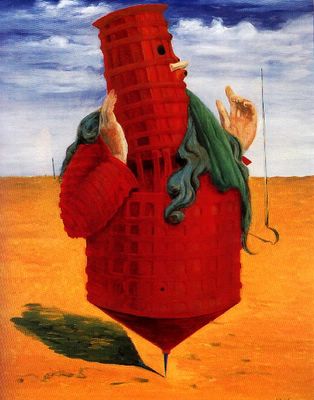
UBU ROI
BY MAX ERNST
OR OUR NOBLE LEADER ?
Posted by Picasa
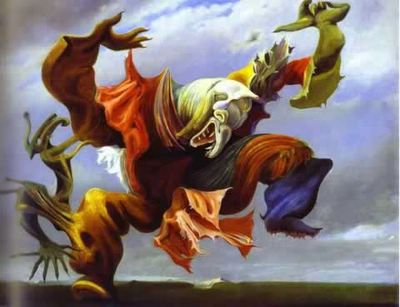
SPECTACULAR
WAR BY MAX ERNST OR LEADERS &
THEIR PEOPLE GONE MAD
Posted by Picasa
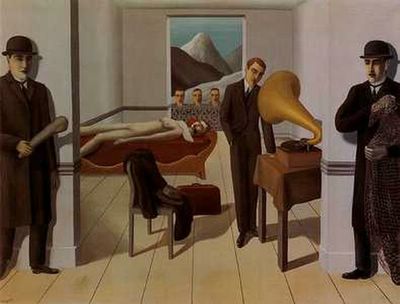
ASSASSINS
BY
RENE MAGRITTE
Posted by Picasa
And excerpts from ANDRÉ Breton's Manifesto of Surrealism & SECRETS OF THE MAGICAL SURREALIST ARTWritten Surrealist composition or first and last draft:
MANIFESTO OF SURREALISM
BY ANDRÉ BRETON (1924)
So strong is the belief in life, in what is most fragile in life – real life, I mean
– that in the end this belief is lost. Man, that inveterate dreamer, daily more discontent with his destiny, has trouble
assessing the objects he has been led to use, objects that his nonchalance has brought his way, or that he has earned through
his own efforts, almost always through his own efforts, for he has agreed to work, at least he has not refused to try his
luck (or what he calls his luck!). At this point he feels extremely modest: he knows what women he has had, what silly affairs
he has been involved in; he is unimpressed by his wealth or his poverty, in this respect he is still a newborn babe and, as
for the approval of his conscience, I confess that he does very nicely without it. If he still retains a certain lucidity,
all he can do is turn back toward his childhood which, however his guides and mentors may have botched it, still strikes him
as somehow charming. There, the absence of any known restrictions allows him the perspective of several lives lived at once;
this illusion becomes firmly rooted within him; now he is only interested in the fleeting, the extreme facility of everything.
Children set off each day without a worry in the world. Everything is near at hand, the worst material conditions are fine.
The woods are white or black, one will never sleep.
But it is true that we would not dare venture so far, it is not merely a question of distance.
Threat is piled upon threat, one yields, abandons a portion of the terrain to be conquered. This imagination which knows no
bounds is henceforth allowed to be exercised only in strict accordance with the laws of an arbitrary utility; it is incapable
of assuming this inferior role for very long and, in the vicinity of the twentieth year, generally prefers to abandon man
to his lusterless fate.
Though he may later try to pull himself together on occasion, having felt that he is losing by slow degrees all reason for
living, incapable as he has become of being able to rise to some exceptional situation such as love, he will hardly succeed.
This is because he henceforth belongs body and soul to an imperative practical necessity which demands his constant attention.
None of his gestures will be expansive, none of his ideas generous or far-reaching. In his mind’s eye, events real or
imagined will be seen only as they relate to a welter of similar events, events in which he has not participated, abortive
events. What am I saying: he will judge them in relationship to one of these events whose consequences are more reassuring
than the others. On no account will he view them as his salvation.
Beloved imagination, what I most like in you is your unsparing quality.
There remains madness, "the madness
that one locks up," as it has aptly been described. That madness or another…. We all know, in fact, that the insane
owe their incarceration to a tiny number of legally reprehensible acts and that, were it not for these acts their freedom
(or what we see as their freedom) would not be threatened. I am willing to admit that they are, to some degree, victims of
their imagination, in that it induces them not to pay attention to certain rules – outside of which the species feels
threatened – which we are all supposed to know and respect. But their profound indifference to the way in which we judge
them, and even to the various punishments meted out to them, allows us to suppose that they derive a great deal of comfort
and consolation from their imagination, that they enjoy their madness sufficiently to endure the thought that its validity
does not extend beyond themselves. And, indeed, hallucinations, illusions, etc., are not a source of trifling pleasure. The
best controlled sensuality partakes of it, and I know that there are many evenings when I would gladly that pretty hand which,
during the last pages of Taine’s L’Intelligence, indulges in some curious misdeeds. I could spend my whole life
prying loose the secrets of the insane. These people are honest to a fault, and their naiveté has no peer but my own. Christopher
Columbus should have set out to discover America with a boatload of madmen. And note how this madness has taken shape, and
endured.
It is not the
fear of madness which will oblige us to leave the flag of imagination furled.
The case against the realistic attitude demands to be examined, following the case
against the materialistic attitude. The latter, more poetic in fact than the former, admittedly implies on the part of man
a kind of monstrous pride which, admittedly, is monstrous, but not a new and more complete decay. It should above all be viewed
as a welcome reaction against certain ridiculous tendencies of spiritualism. Finally, it is not incompatible with a certain
nobility of thought.
By
contrast, the realistic attitude, inspired by positivism, from Saint Thomas Aquinas to Anatole France, clearly seems to me
to be hostile to any intellectual or moral advancement. I loathe it, for it is made up of mediocrity, hate, and dull conceit.
It is this attitude which today gives birth to these ridiculous books, these insulting plays. It constantly feeds on and derives
strength from the newspapers and stultifies both science and art by assiduously flattering the lowest of tastes; clarity bordering
on stupidity, a dog’s life. The activity of the best minds feels the effects of it; the law of the lowest common denominator
finally prevails upon them as it does upon the others. An amusing result of this state of affairs, in literature for example,
is the generous supply of novels. Each person adds his personal little "observation" to the whole. As a cleansing antidote
to all this, M. Paul Valéry recently suggested that an anthology be compiled in which the largest possible number of opening
passages from novels be offered; the resulting insanity, he predicted, would be a source of considerable edification. The
most famous authors would be included. Such a though reflects great credit on Paul Valéry who, some time ago, speaking of
novels, assured me that, so far as he was concerned, he would continue to refrain from writing: "The Marquise went out at
five." But has he kept his word?
--- And as for Guillaume Apollinaire he concludes...
...In homage to Guillaume Apollinaire, who had just died and who, on several occasions,
seemed to us to have followed a discipline of this kind, without however having sacrificed to it any mediocre literary means,
Soupault and I baptized the new mode of pure expression which we had at our disposal and which we wished to pass on to our
friends, by the name of SURREALISM. I believe that there is no point today in dwelling any further on this word and that the
meaning we gave it initially has generally prevailed over its Apollinarian sense. To be even fairer, we could probably have
taken over the word SUPERNATURALISM employed by Gérard de Nerval in his dedication to the Filles de feu.* (And also by Thomas
Carlyle in Sartor Resartus ([Book III] Chapter VIII, "Natural Supernaturalism"), 1833-34.) It appears, in fact, that Nerval
possessed to a tee the spirit with which we claim a kinship, Apollinaire having possessed, on the contrary, naught but the
letter, still imperfect, of Surrealism, having shown himself powerless to give a valid theoretical idea of it.
...Those who might dispute our
right to employ the term SURREALISM in the very special sense that we understand it are being extremely dishonest, for there
can be no doubt that this word had no currency before we came along. Therefore, I am defining it once and for all:
SURREALISM, n. Psychic automatism
in its pure state, by which one proposes to express -- verbally, by means of the written word, or in any other manner -- the
actual functioning of thought. Dictated by the thought, in the absence of any control exercised by reason, exempt from any
aesthetic or moral concern.
ENCYCLOPEDIA. Philosophy. Surrealism is based on the belief in the superior reality of certain forms of previously neglected
associations, in the omnipotence of dream, in the disinterested play of thought. It tends to ruin once and for all all other
psychic mechanisms and to substitute itself for them in solving all the principal problems of life. The following have performed
acts of ABSOLUTE SURREALISM: Messrs. Aragon, Baron, Boiffard, Breton, Carrive, Crevel, Delteil, Desnos, Eluard, Gérard, Limbour,
Malkine, Morise, Naville, Noll, Péret, Picon, Soupault, Vitrac.We do not have any talent; ask Philippe Soupault:
"Anatomical products of manufacture
and low-income dwellings will destroy the tallest cities."
Ask Roger Vitrac:
"No sooner had I called forth the marble-admiral than he turned on his heel like a horse which
rears at the sight of the North star and showed me, in the plane of his two-pointed cocked hat, a region where I was to spend
my life."
Ask Paul Eluard:
"This is an oft-told tale that
I tell, a famous poem that I reread: I am leaning against a wall, with my verdant ears and my lips burned to a crisp."
Ask Max Morise:
"The bear of the caves and his friend the bittern,
the vol-au-vent and his valet the wind, the Lord Chancellor with his Lady, the scarecrow for sparrows and his accomplice the
sparrow, the test tube and his daughter the needle, this carnivore and his brother the carnival, the sweeper and his monocle,
the Mississippi and its little dog, the coral and its jug of milk, the Miracle and its Good Lord, might just as well go and
disappear from the surface of the sea."
Ask Joseph Delteil:
"Alas! I believe in the virtue of birds. And a feather is all it takes to make me die laughing."
Ask Louis Aragon:
"During a short break in the party, as the players were
gathering around a bowl of flaming punch, I asked a tree if it still had its red ribbon."
And ask me, who was unable to keep myself from writing the
serpentine, distracting lines of this preface.
And Breton goes on to explain about the use of surrealist imagery:
The countless kinds of Surrealist images would require a classification which I
do not intend to make today. To group them according to their particular affinities would lead me far afield; what I basically
want to mention is their common virtue. For me, their greatest virtue, I must confess, is the one that is arbitrary to the
highest degree, the one that takes the longest time to translate into practical language, either because it contains an immense
amount of seeming contradiction or because one of its terms is strangely concealed; or because, presenting itself as something
sensational, it seems to end weakly (because it suddenly closes the angle of its compass), or because it derives from itself
a ridiculous formal justification, or because it is of a hallucinatory kind, or because it very naturally gives to the abstract
the mask of the concrete, or the opposite, or because it implies the negation of some elementary physical property, or because
it provokes laughter. Here, in order, are a few examples of it:
The ruby of champagne. (LAUTRÉAMONT)
Beautiful as the law of arrested development of the breast in adults, whose propensity
to growth is not in proportion to the quantity of molecules that their organism assimilates. (LAUTRÉAMONT)
A church stood dazzling as a bell. (PHILIPPE SOUPAULT)
In Rrose Sélavy's sleep there is
a dwarf issued from a well who comes to eat her bread at night. (ROBERT DESNOS)
On the bridge the dew with the head of a tabby cat lulls itself to sleep. (ANDRÉ
BRETON)
A little to the
left, in my firmament foretold, I see -- but it's doubtless but a mist of blood and murder -- the gleaming glass of liberty's
disturbances. (LOUIS ARAGON)
In the forest aflame
The lions were fresh. (ROBERT VITRAC)
The color of a woman's stockings is not necessarily in the likeness of her eyes, which led a philosopher who it is
pointless to mention, to say: "Cephalopods have more reasons to hate progress than do quadrupeds."
AND:
Everything is valid when it comes to obtaining the desired suddenness from certain
associations. The pieces of paper that Picasso and Braque insert into their work have the same value as the introduction of
a platitude into a literary analysis of the most rigorous sort. It is even permissible to entitle POEM what we get from the
most random assemblage possible (observe, if you will, the syntax) of headlines and scraps of headlines cut out of the newspapers:
POEM
A burst of laughter
of sapphire in the island of Ceylon
The most beautiful straws
HAVE A FADED COLOR
UNDER THE LOCKS
on an isolated farm
FROM DAY TO DAY
the pleasant
grows worse
coffee
preaches
for its saint
THE DAILY
ARTISAN OF YOUR BEAUTY
MADAM,
a pair
of silk stockings
is not
A leap into space
A STAG
Love above all
Everything could be worked out so well
PARIS IS A BIG VILLAGE
Watch out for
the fire that covers
THE PRAYER
of fair
weather
Know that
The ultraviolet rays
have finished their task
short and sweet
THE FIRST WHITE PAPER
OF CHANCE
Red will be
The wandering singer
WHERE IS HE?
in memory
in his house
AT
THE SUITORS’ BALL
I do
as I dance
What people did, what they’re
going to do
And we could
offer many many more examples. The theater, philosophy, science, criticism would all succeed in finding their bearings there.
I hasten to add that future Surrealist techniques do not interest me.
and an outline of the Manifesto was released to the public:
A SURREALIST MANIFESTO
The Surrealist Manifesto was written
in 1924 by Andre Breton and then signed by such artists as Louis Aragon, Antonin Artaud, Jacques Baron, Joe Bousquet, J.-A.
Boiffard, Jean Carrive, Rene Crevel, Robert Desnos, Paul Elaurd, Max Ernst, and Breton himself. Released to the public on
January 27th 1925.
With
regard to a false interpretation of our enterprise, stupidly circulated among the public, we declare as follows to the entire
braying literary, dramatic, philosophical, exegetical and even theological body of contemporary criticism:
1. We have nothing to do with literature; but we are quite capable, when necessary,
of making use of it like anyone else,
2. Surrealism
is not a new means or expression, or an easier one, nor even a metaphysic of poetry. It is a means of total liberation of
the mind and of all that resembles it.
3. We are determined
to make a Revolution.
4. We have joined the word surrealism
to the word revolution solely to show the disinterested, detached, and even entirely desperate character of this revolution.
5. We make no claim to change the mores of mankind, but we intend
to show the fragility of thought, and on what shifting foundations, what caverns we have built our trembling houses.
6. We hurl this formal warning to Society; Beware of your deviations
and faux-pas, we shall not miss a single one.
7. At
each turn of its thought, Society will find us waiting.
8. We are specialists in Revolt. There is no means of action which we are not capable, when necessary, of employing.
9. We say in particular to the Western world: surrealism exists.
And what is this new ism that is fastened to us? Surrealism is not a poetic form. It is a cry of the mind turning back on
itself, and it is determined to break apart its fetters, even if it must be by material hammers!
Bureaus de Recherches Surrealistes,
15, Rue de Grenelle
Surrealism Plays.com Surrealism& Avant-Garde Theatre
Keith Wigdor Presents Surrealism Now!
| The Virgin Spanking Jesus |
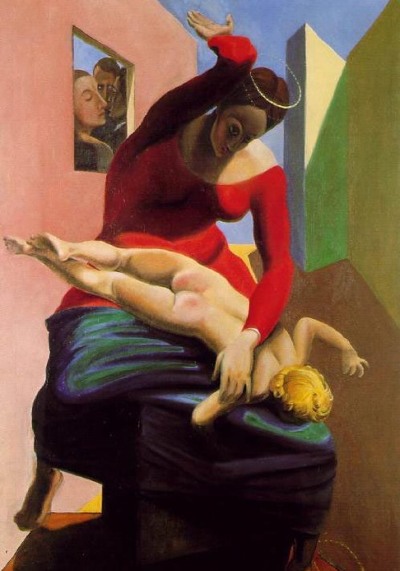
|
| Children Menaced by a Nightingale by Rene Magritte |
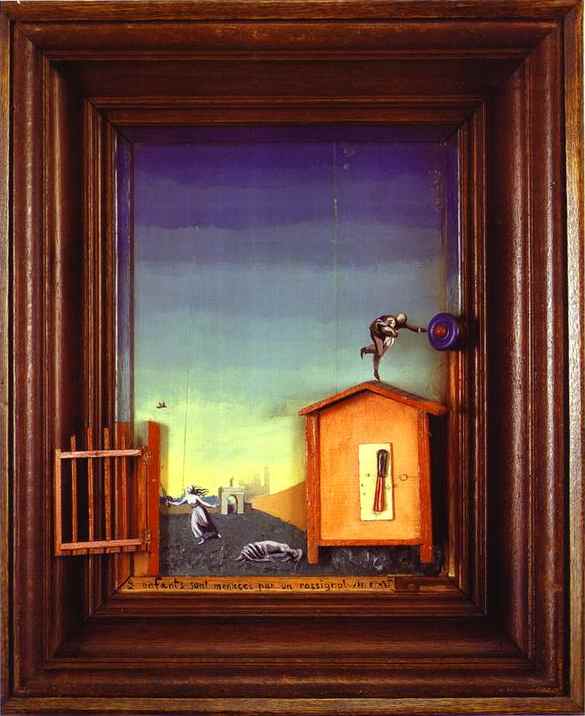
|
| Elephant Celebes by Max Ernst |
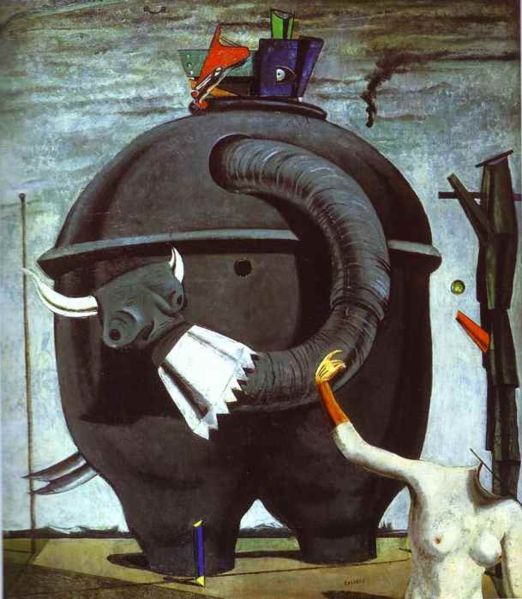
|
| Tilled Field by Joan Miro (1893-1983) |
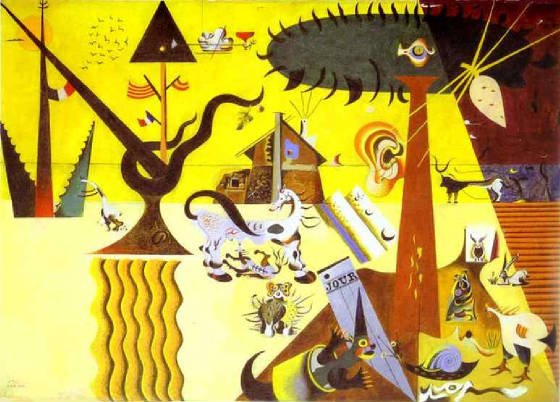
|
From DADA TO SURREALISM TO PUNK: POST-MODERNISM 
| YVES TANGUY: THE BIG WINDOW | 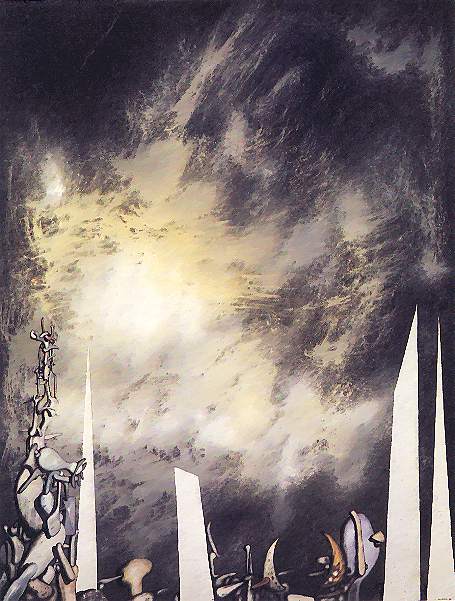

|
| YVES TANGUY: The Sensitive Layer | 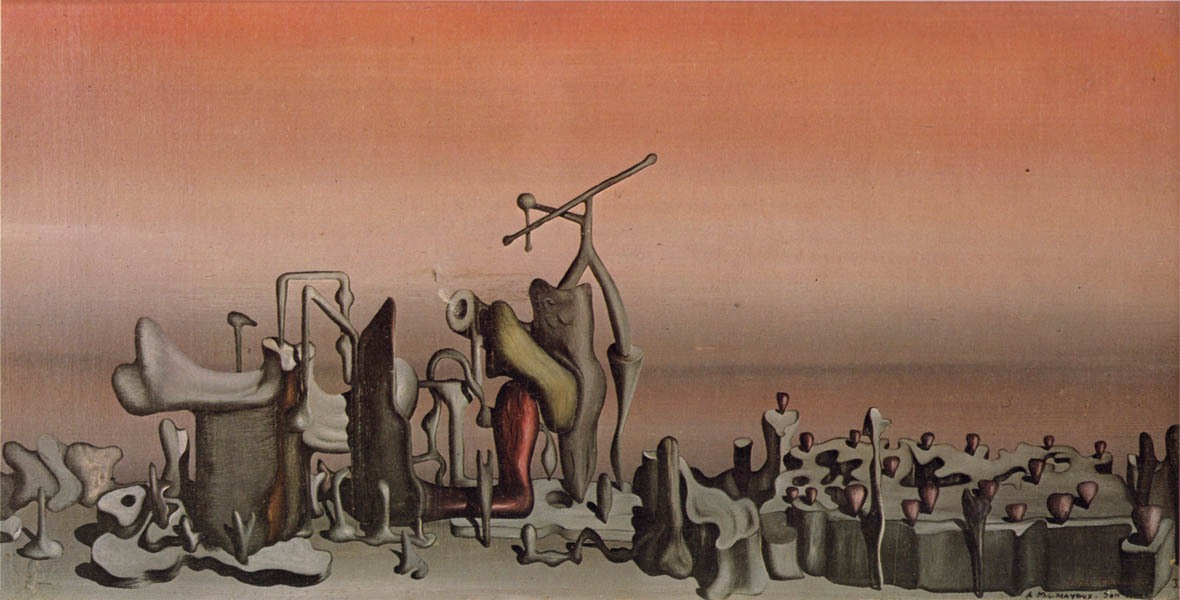

|
| YVES TANGUY: THE SUN IN ITS JEWEL CASE | 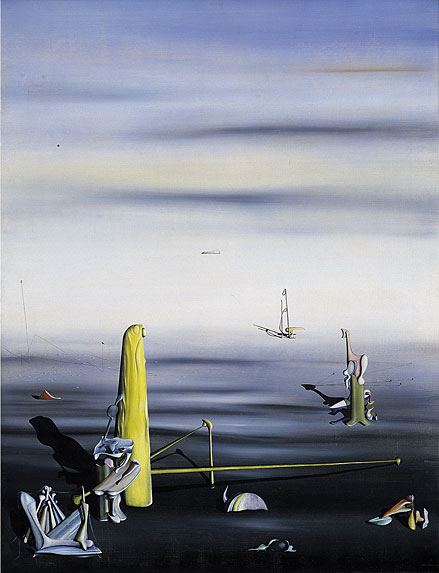

|
| YVES TANGUY: FURNITURE OF TIME | 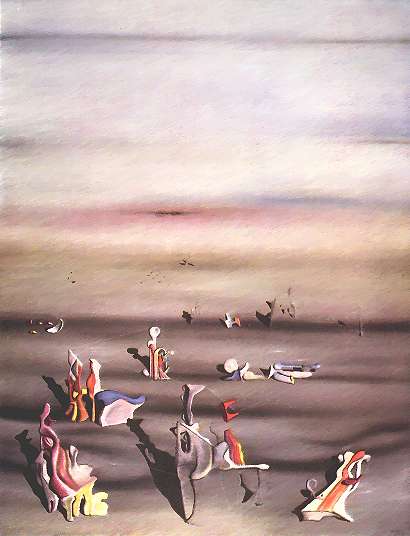

|
| YVES TANGUY: NEITHER LEGENDS NOR SHAPES | 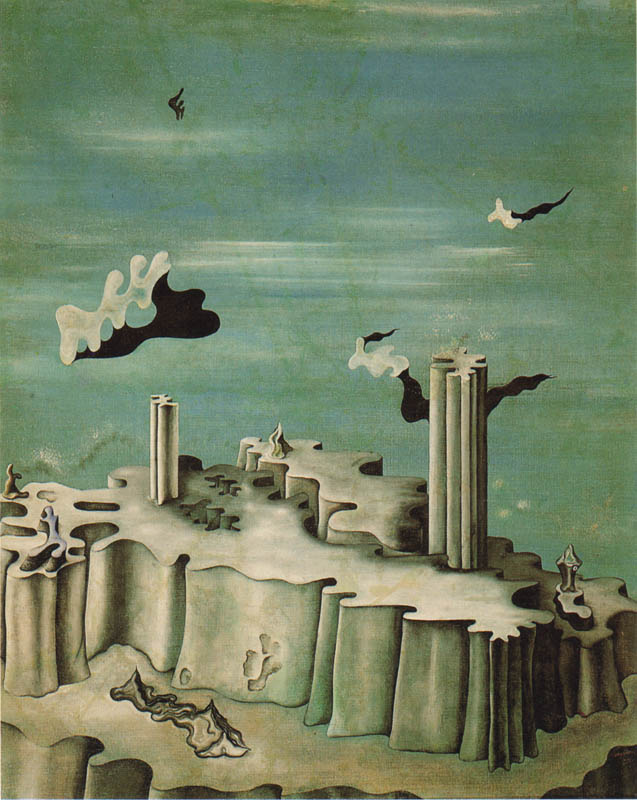

|
|  | | YVES TANGUY : FROM GREEN TO WHITE | 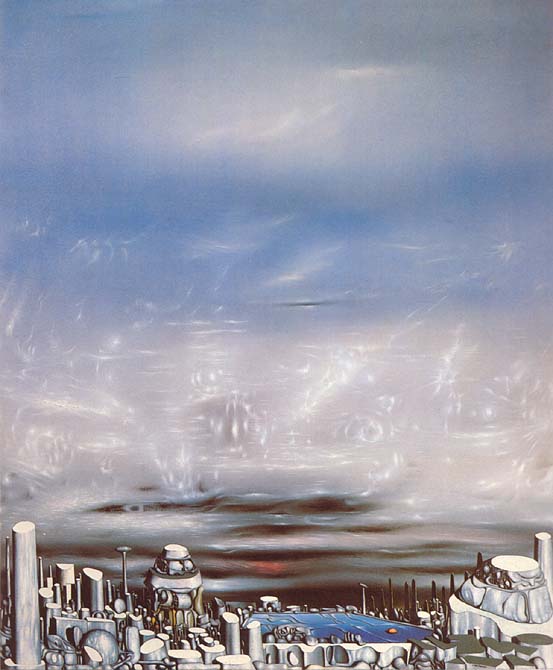

|
YVES
TANGUY PUNK SURREALIST &THE INVASION OF THE BIOMORPHS & AN ALTERNATE VERSION OF THE POEM "SENSUOUS ANGEL OR THE ROSE
OF SHARON"

PHOTO BY MAN RAY in
1936 OF SURREALIST YVES TANGUY (1900-1955)
Posted by Hello
In the above photo Tanguy appears a few decades ahead of his time as a Proto-Punk
“Tanguy’s slight
madness seeps into his artwork as did Dali’s, some examples of the more eccentric side of the artist are chewing his
socks and marinating spiders in wine. Indeed, he liked nothing more than such novelty in his art, commenting: “I found
that if I planned a picture beforehand, it never surprised me, and surprises are my pleasure in painting”

PAINTING BY SURREALIST
YVES TANGUY (1900-1955) " RECEIVES GRACE"
Posted by Hello
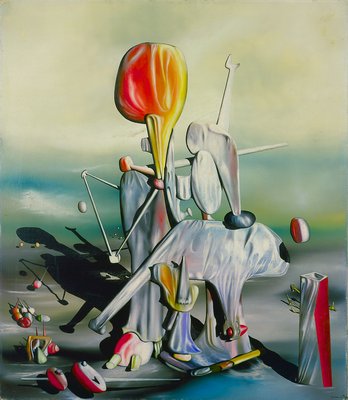
PAINTING BY YVES TANGUY
(1900-1955) " THROUGH BIRDS,THROUGH FIRE, BUT NOT THROUGH GLASS"
Posted by Hello
“Through Birds, through Fire, but Not through Glass looks
almost like a portrait of the strange biomorphic form in the center of the painting. Just as dreams often include fragments
of everyday life, Yves Tanguy combined outer and inner "reality" into a single work of art. Although the alien-like forms
are fantasy, they are painted realistically in three-dimensional form. Several smaller forms lie or float in the landscape,
helping to create the illusion of distance. The objects are bathed in light and, like objects from the real world, they cast
shadows upon the ground. The shadows help to make the shapes appear real, yet they do not look like anything from the real
world. Instead, they look like creatures from another world. Throughout the painting there is a feeling of mystery and ambiguity.
"
from The Surrealists Website
www.surrealists.co.uk

PAINTING BY SURREALIST
YVES TANGUY (1900-1955) " THE RIBBON OF EXTREMES "
Posted by Hello

PAINTING BY SURREALIST
YVES TANGUY (1900-1955) " INDEFINITE INDIVISIBILITY"
Posted by Hello
Here are some details & musings gleaned from the Net about the surrealist painter Yves Tanguy (1900-1955) &
some general comments on Surrealism:
"Surrealism grew out of the despair caused by the devastations of World War I.
A young generation of artists lost faith in humanity and rational thought. The Surrealists felt that the outside world had
failed them so they turned to the subconscious mind for inspiration. This inner world of powerful images and ideas had been
explored by Sigmund Freud through psychoanalysis. Freud's theories about the human mind and his writings on the interpretation
of dreams strongly influenced the Surrealists. The Surrealists believed that the images and experiences in dreams could be
used as inspiration for poetry and art. As a result, dreams, fantasy, and the element of chance played an important role in
their work."
"Tanguy, Yves (1900-55). French-born American painter. Originally a merchant seaman, he was impelled to
take up painting after seeing pictures by de Chirico and in 1925 joined the Surrealist group. In 1939 he emigrated to the
USA, where he lived for the rest of his life, marrying the American Surrealist painter Kay Sage in 1940 and becoming an American
citizen in 1948. Tanguy's most characteristic works are painted in a scrupulous technique reminiscent of that of Dalí, but
his imagery is highly distinctive, featuring half marine and half lunar landscapes in which amorphous nameless objects proliferate
in a spectral dream-space... "
from The Surrealists Website
www.surrealists.co.uk
see: SURREALISM
:THE DREAM OF REVOLUTION
20th Century
to_explorations.
www.nelepets.com/art/pictures/ Surrealism
www.artsconnected.org
ArtsNet Minnesota:
Inner Worlds: Yves Tanguy
also see:
www.matta-art.com/tanguy
WEBMUSEUM,PARIS
/www.ibiblio.org/wm/paint/auth/tanguy
Here
is a second version of the poem Sensuous Angel or The Rose of Sharon which
was posted on Friday April 15,2005.
The purpose behind doing this is to show the way in which a poem evolves going through
a number of variations & how difficult it can be to decide on which is to be the final incarnation of a particular piece
of poetry. Here the character in the poem is definitively located at THE CAFE APOLLINAIRE.
earthbound angels #5
lost child of god or the rose of sharon
edited
1, 2002
At the Café Apollinaire there is
a beautiful golden haired angel
who has lost her way
giving her body
to every man she meets
she is an alien being
having come from a distant galaxy
where all the women are concubines
use
their bodies as bait to fish for souls
in the name of Christ
& a hypersexual phony prophet
whose names
are legion
turning scripture on its head
as she globe trots from country to country
preparing for the Millennium
the
end days & the Great Rapture
hopping from bed to bed
one ceiling the same as another
when she's lying on
her back
hearing a voice she believes to be an angel
but it is a wolf in sheep's clothing-
The golden haired
concubine
of the Café Apollinaire
is a chamaeleon changing
for each lover she meets
some men want to save her
some
men just want to use her
& no man can refuse her
she is an angel in the flesh
as she moves from table to
table
you reach out to touch her
only to discover too late
she is a mirage
a strange woman passing through
your
surreal dreams
lost in twisted misshapen
cold silent corridors
as men & women
wander about naked
having
no power to speak-
Having seen all the warning signs
still the hypersensitive
sentimental-lost in the clouds
romantic
mad reclusive monk
falls in love with
the golden haired concubine
of the Café Apollinaire
only to lose what's
left of his mind
as he goes into a manic state
kneeling at her feet in the café
proclaiming his love
turning the
drama into a public spectacle
another side-show attraction
as she refuses profusely
shows him a golden chest
full
of mad artist's ears
given to her as tokens of love
lust & desire -
Anyway that's it for now,
GORD

|  | |  | |  | |
| |
 
|
